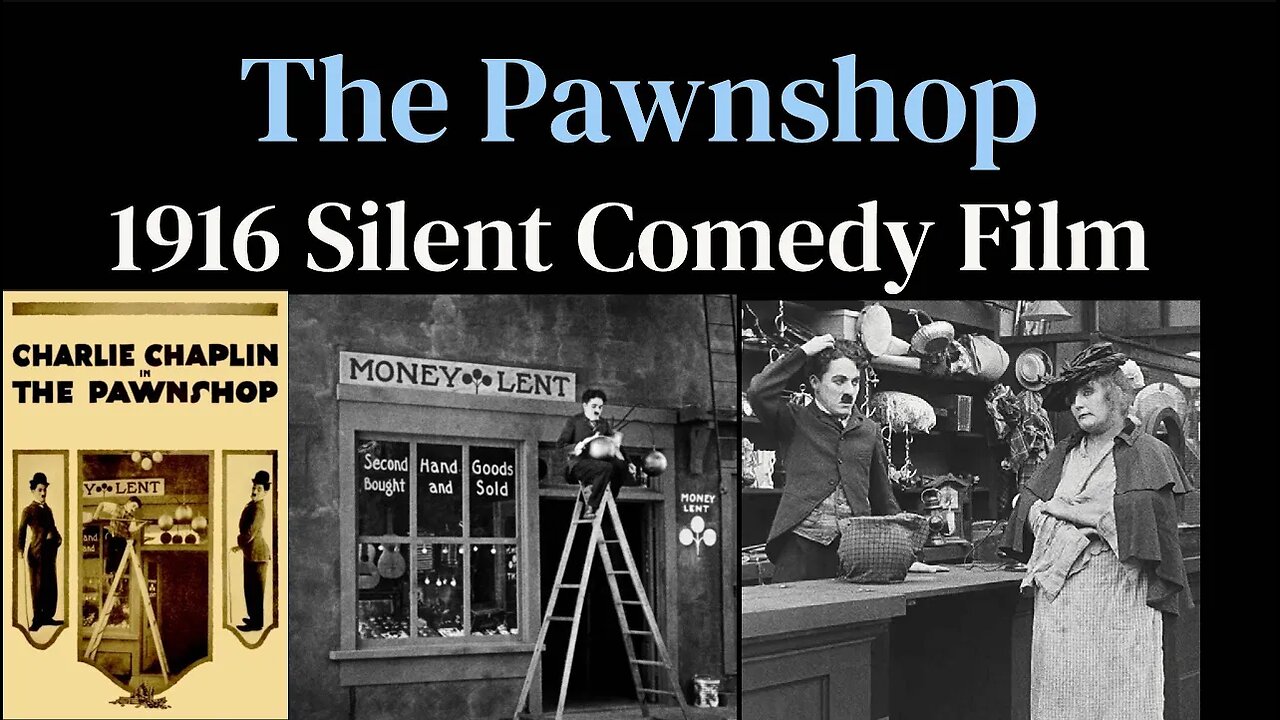Premium Only Content

The Pawnshop (1916 Silent Comedy film)
The Pawnshop was Charlie Chaplin's sixth film for Mutual Film Corporation. Released on October 2, 1916, it stars Chaplin in the role of assistant to the pawnshop owner, played by Henry Bergman. Edna Purviance plays the owner's daughter, while Albert Austin appears as an alarm clock owner who watches Chaplin in dismay as he dismantles the clock; the massive Eric Campbell's character attempts to rob the shop.
This was one of Chaplin's more popular movies for Mutual, mainly for the slapstick comedy he was famous for at the time.
Synopsis
Chaplin plays an assistant in a pawnshop run by Henry Bergman. He goes about his job in the usual comic Chaplin manner: insulting various eccentric customers and dusting an electric fan while it is running. Quarreling over a ladder, Chaplin engages in a slapstick battle with his fellow pawnshop assistant and is fired. The pawnbroker gives Charlie a second chance because of his "eleven children"—a fiction which Charlie has hastily invented for the occasion. In the kitchen Charlie flirts with the pawnbroker's attractive daughter, helping her dry dishes by passing them through a clothes wringer. When a customer brings in an alarm clock to be pawned, Chaplin engages in one of his most famous solo sustained comedy bits: He thoroughly examines the clock as if he were a physician and a jeweler. He disassembles the clock piece by piece, damaging it beyond repair, and carefully puts the pieces into the man's hat. He then sorrowfully informs him that the clock cannot be accepted.
Primary cast
Charles Chaplin: Pawnbroker's assistant
Henry Bergman: Pawnbroker
Edna Purviance: His daughter
John Rand: Pawnbroker's assistant
Albert Austin: Client with clock
Wesley Ruggles: Client with ring
Eric Campbell: Thief
James T. Kelley: Old bum
Charlotte Mineau: Client with aquarium
Frank J. Coleman: Policeman
Sound version
In 1932, Amedee J. Van Beuren of Van Beuren Studios, purchased Chaplin's Mutual comedies for $10,000 each, added music by Gene Rodemich and Winston Sharples and sound effects, and re-released them through RKO Radio Pictures. Chaplin had no legal recourse to stop the RKO release.
-
 LIVE
LIVE
The Big Mig™
1 hour agoIn Honor Of Charlie Kirk, Rest In Peace 🙏🏻
3,350 watching -
 1:36:35
1:36:35
The White House
3 hours agoPresident Trump and the First Lady Attend a September 11th Observance Event
52.9K18 -
 1:38:49
1:38:49
Dear America
2 hours agoWe Are ALL Charlie Now! This Isn’t The End. We Will FIGHT FIGHT FIGHT
140K167 -
 LIVE
LIVE
Badlands Media
9 hours agoBadlands Daily: September 11, 2025
4,903 watching -
 LIVE
LIVE
Wendy Bell Radio
6 hours agoA Watershed Moment
8,324 watching -
 4:24
4:24
Bearing
6 hours agoCharlie Kirk ♥️
9.1K43 -
 1:07:12
1:07:12
The Mike Schwartz Show
2 hours agoTHE MIKE SCHWARTZ SHOW with DR. MICHAEL J SCHWARTZ 09-11-2025
5.07K3 -
 2:12:41
2:12:41
Chicks On The Right
5 hours agoCharlie Kirk's assassination, the reaction, and where we all go from here.
65.9K19 -
 1:10:14
1:10:14
JULIE GREEN MINISTRIES
4 hours agoWHAT DO WE DO NOW?
135K359 -
 4:00:20
4:00:20
The Bubba Army
1 day agoCharlie Kirk's Killer On The Run - Bubba the Love Sponge® Show | 9/11/25
145K54